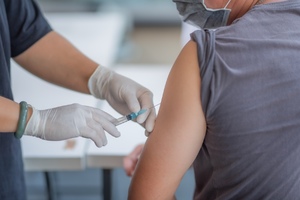JCVI advises prioritising homeless people and rough sleepers for COVID-19 vaccine
The JCVI has advised the government to prioritise people experiencing homelessness, including those sleeping rough, for the coronavirus (COVID-19) vaccine.

Many people who are homeless or sleeping rough are likely to have underlying health conditions which would place them in priority group 6. These are likely to be under-diagnosed or not properly reflected in GP records.
Due to current restrictions, many thousands of people who sleep rough have been housed in emergency accommodation. This provides a unique opportunity to offer vaccination to those often unable to access basic healthcare.
The Joint Committee on Vaccination and Immunisation (JCVI) advises that local teams consider a universal offer to adults experiencing homelessness and rough sleeping alongside those in priority group 6.
They should also be offered the vaccine without the need for an NHS number or GP registration.
Local decisions should be taken on whether a shorter schedule may be offered if they are unlikely to return for the second dose at 12 weeks.
Operationally, it is anticipated that the Oxford-AstraZeneca vaccine will be easier to deploy to this group of people. The optimal timing for the second dose of the Oxford-AstraZeneca vaccine is 8 to 12 weeks after the first dose.
Professor Wei Shen Lim, COVID-19 Chair for JCVI, said:
The JCVI’s advice on COVID-19 vaccine prioritisation was developed with the aim of preventing as many deaths as possible.
People experiencing homelessness are likely to have health conditions that put them at higher risk of death from COVID-19.
This advice will help us to protect more people who are at greater risk, ensuring that fewer people become seriously ill or die from the virus.
Rosanna O’Connor, Acting Director for Health Improvement at Public Health England, said:
People who are homeless or who sleep rough face reduced access to healthcare, and experience some of the highest rates of poor health outcomes and undiagnosed health issues.
We welcome this decision of JCVI and are pleased to have supported the committee with the evidence that helped make this decision, which will protect those who are most vulnerable and may be at increased of severe illness or death from COVID-19.
The JCVI will continue to consider the emerging evidence and will keep its advice under review.
The JCVI letter outlining the recommendations is available in full.